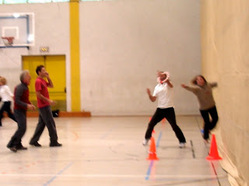As Armour (2010) has recently stated, sport pedagogy is a field whose time has come to bring people together to consider the needs of all young learners when teaching and coaching. Thus, it is imperative that we can review the research literature to locate evidence for some of the possible challenges that teachers and coaches face when implementing game-centred approaches to teaching and coaching as well as some of the possible opportunities of these approaches. For this task I will refer only to what I consider are the three most important challenges and opportunities of game-centered approaches. First I will overview the potential challenges before turning to the opportunities.
Challenges of Game-Centered approaches
Given that the time is right for sport pedagogy, I feel that it is pertinent to highlight that the most fundamental challenge is in supporting teachers and coaches while they develop their understanding and embodiment of game-centered approaches AND constructivist theories of learning (Harvey et al., 2010, Light & Evans, 2010; Light, 2008). Certainly, planning to prevent a ‘roll out the ball’ teaching approach is critical (Harvey et al., 2010; Howarth, 2005) and more specifically, modifying the training environment (Harvey et al., 2010) in order to ‘get the game right’ (Thorpe & Bunker, 2008) using the ‘goldilocks principle’ (Rovegno et al., 2001). In addition, planning pertinent higher order questions to stimulate critical thinking and dialogue among players is a key pedagogical technique to foster players learning.
Secondly, the repositioning of coach (Harvey et al., 2010; Light, 2004) so they can ‘step back’ and facilitate player learning by using the aforementioned strategies of game modifications and questioning. What is more, this stepping back allows for the reduction of power relations between the players and the teacher/coach so they are positioned as a partner in learning (Light, 2004).
Finally, and importantly, Light (2004) had found that the aesthetics of training and the expectations of the club committee or school management may actually deter teachers and coaches from using these approaches. As one of Light’s study participants mentioned, I do drills when the committee come round, but I use Game Sense at all other times.
In sum, all of these factors, pedagogy, the repositioning of the teacher/coach, and the aesthetics of training are all important challenges that teachers and coaches must address when implementing game-centred approaches.
Opportunities of Game-Centered approaches
Given that in most games, especially team games, only a small percentage of time is spent on-the-ball, the biggest opportunity for game-centered approaches is that it can look to develop players skills for working off-the-ball (Harrison et al., 2004, Harvey, 2006, Light, 2004, Turner & Martinek, 1999). Indeed, my assertion, along with that of the researchers cited above, is that teaching the tactical aspects of games can only occur when players are taught within the game context. Playing in game-type situations in practice enables players to develop decision-making and aspects of a ‘sense of the game’ through implicit learning that cannot be directly taught to players (Light & Evans, 2010). This emphasis was also one of the major reasons for the initial development of the Teaching Games for Understanding model in the 1980’s which followed on from the approaches in France of Mahlo (1974) and Deleplace (1966, 1979) where they investigated the modelling of practice in team games. From the work of Mahlo and Deleplace, a school of thought emerged that recognized cognitive processes to be necessary for the correct execution of motor skills within game situations (see Gréhaigne, Richard, and Griffin 2005 for a review).
Secondly, and linked to the first opportunity I highlighted, teaching ‘through and in the game’ (Launder, 2001, p. 55) not only enables positive transfer from practice sessions to match situations (Harvey, 2009, Harvey et al., 2010, Light, 2004) but also positive transfer from game within the same category of games (Jones & Farrow 1999, Memmert & Harvey, 2010, Mitchell & Oslin 1999).
The final opportunity of game-centered approaches are their ability for the development of independent players (Light, 2004) and player motivation (Evans & Light, 2008, Light, 2004). It has also been shown that skillful questioning can promote engagement of players (Harvey, 2009, Harvey et al., 2010).
As with the challenges, these three factors are interdependent and all influence the teacher or coaches ability to utilise game-centered approaches to teaching and coaching. Nonetheless I would like to stimulate some discussion on the Practitioner Research Network by concluding with some questions:
1. How prevalent is the use of game-centered approaches to teaching and/or coaching?
2. How did you learn/not learn about game-centered approaches?
3. What do you feel are some of the solutions to the challenges highlighted above?
4. What are some of the additional benefits of game-centered approaches to teaching and/or coaching? (e.g. learning in the affective domain, ethical development, etc.)
5. What are some of the factors which may influence the incorporation of game-centered approaches into your teaching and/or coaching?



